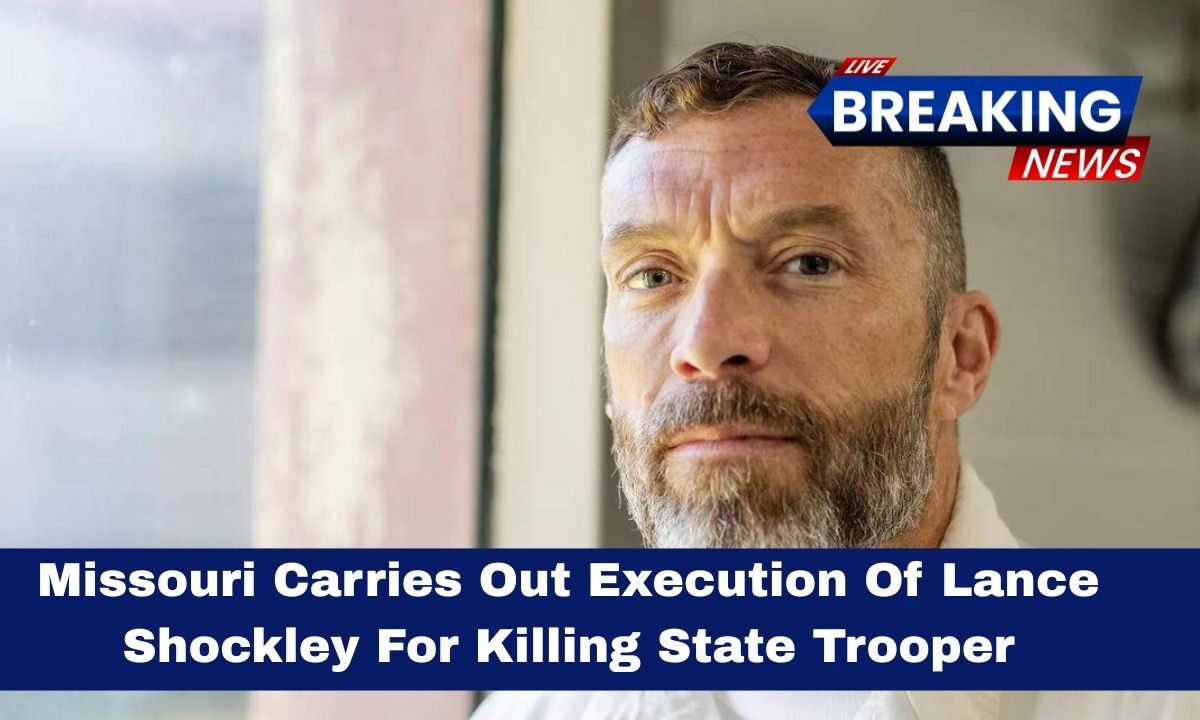Missouri carried out the execution of Lance Shockley on October 14, 2025, for the ambush murder of a state trooper in 2005.
Shockley was pronounced dead at 6:13 p.m. after a lethal injection was administered at the Eastern Reception, Diagnostic and Correctional Center in Bonne Terre, Missouri.
Below is a comprehensive account of the case, exploring the crime, legal path, final appeals, reactions, and the broader context.
A Shocking Crime- The Ambush of Sgt. Graham
In March 2005, Shockley lay in wait near the home of Missouri State Highway Patrol Sgt. Carl Dewayne Graham Jr. in Van Buren.
As Sgt. Graham returned from duty, he was ambushed—shot with both a rifle and a shotgun. Investigators believe Shockley engineered the attack after Graham had been probing a fatal crash earlier that involved Shockley.
Graham was a respected trooper with more than a decade of service; his sudden death stunned the patrol community and galvanized the state’s law enforcement agencies to pursue justice.
Trial, Conviction, and the Death Sentence
Shockley’s trial occurred years later. In 2009, he was found guilty of first-degree murder.
However, during the penalty phase, the jury could not unanimously agree on whether Shockley should face the death penalty or life in prison.
Under Missouri’s statutes, when a jury is deadlocked on sentencing, the decision shifts to the judge. The presiding judge opted for the death sentence.
Shockley’s defense repeatedly challenged this outcome, alleging trial errors, ineffective assistance of counsel, and untested pieces of evidence that might harbor exculpatory DNA.
Over many years, numerous appeals were filed—and denied—in state and federal courts.
Final Petitions and Denied Clemency
In the days leading to October 14, Shockley’s legal team made urgent pleas. They pushed for additional DNA testing of physical evidence not analyzed during prior proceedings.
Supporters rallied, sending petitions and protest letters to the governor’s office.
On October 13, Governor Mike Kehoe denied clemency, paving the way for the scheduled execution. The U.S. Supreme Court declined to interven e mere hours before the procedure, leaving Shockley’s execution intact.
Execution Day- Events and Protocol
On the day of execution, Shockley was permitted a final meal, which reportedly included peanut butter, oatmeal, water, and sports drinks.
As the late afternoon gave way to evening, corrections officials administered pentobarbital via lethal injection. At 6:13 p.m., the state declared him dead.
Outside the facility, a gathering of approximately 90 protesters voiced their opposition. Simultaneously, law enforcement supporters and family members of Sgt.
Graham were present, witnessing the culmination of a long ordeal.
Key Facts At A Glance
| Detail | Information |
|---|---|
| Executed | October 14, 2025, at 6:13 p.m. (lethal injection) |
| Location | Eastern Reception, Diagnostic & Correctional Center, Bonne Terre, Missouri |
| Age | 48 |
| Victim | Sgt. Carl Dewayne Graham Jr. |
| Murder Date | March 20, 2005 |
| Crime Location | Near Graham’s residence in Van Buren |
| Conviction | Guilty of first-degree murder (2009) |
| Jury Verdict on Punishment | Deadlocked |
| Sentence | Judge imposed the death penalty |
| Clemency | Denied by Governor Kehoe on October 13, 2025 |
| Execution Drug | Pentobarbital |
| Final Meal | Peanut butter, oatmeal, water, sports drinks |
| Protesters | Around 90 outside the prison |
| Notable | First execution in Missouri in 2025 |
Wider Context- Executions in 2025 and Missouri’s Capital Law
Shockley’s execution was Missouri’s first of 2025. Across the United States, executions have escalated compared to prior years, with several states moving ahead with scheduled capital punishments.
Missouri’s laws permit a judge to impose death if a jury cannot agree on a sentence, a feature that has made some cases particularly controversial.
The case also renewed attention to debates over the death penalty, especially in scenarios involving no recovered weapon, late DNA testing, and claims of legal missteps.
Reactions nAd Reflections
- Government voices portrayed the execution as defense of law and order. Officials emphasized the sanctity of law enforcement and the uncompromising stance against violence directed at officers.
- Law enforcement and trooper community mourned Sgt. Graham’s loss and welcomed closure after two decades. Graham was remembered as a dedicated public servant.
- Opponents of capital punishment, advocacy organizations, and protesters criticized the state’s handling of last-minute appeals and decried the execution in the face of unresolved forensic questions.
The execution of Lance Shockley on October 14, 2025, closes one of Missouri’s most enduring and controversial capital murder cases.
From the 2005 ambush of a state trooper to a jury deadlock and judge-imposed sentence, through repeated appeals and clemency requests—it’s a story of legal complexity, human tragedy, and procedural finality.
Whether one views the outcome as justice fulfilled or questions the process, the case underscores the profound challenges inherent in administering the death penalty in the modern era.




